Preparing for an SEO Audit
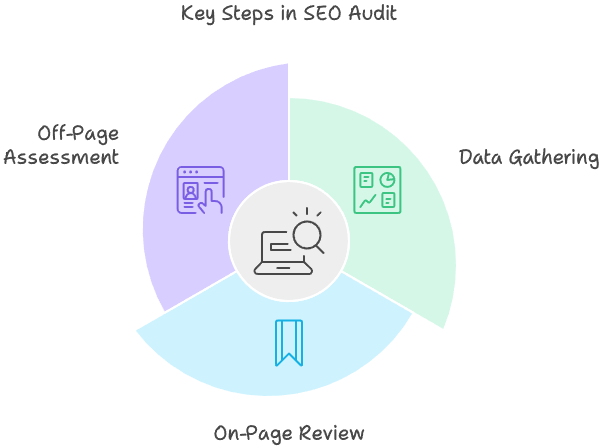
Conducting an SEO audit is essential for identifying how well your website is optimized for search engines. This process helps pinpoint errors that can hinder your rankings and uncover opportunities for enhanced visibility.
Understanding the Importance
An SEO audit serves as a diagnostic tool to assess your website’s technical health, traffic performance, and backlink profile. Addressing the shortcomings found during the audit can significantly improve your site’s organic visibility. Key reasons why an SEO audit is crucial include:
- Identifying Errors: Spotting technical issues that prevent your site from ranking well.
- Optimizing Performance: Understanding how to improve user experience and site speed, which are vital for maintaining visitor engagement.
- Improving Visibility: Uncovering opportunities for optimizing content and structure, thereby increasing the chances of ranking higher in search results.
The importance of a thorough audit cannot be overstated, especially in today’s competitive online landscape. For professional assistance, consider exploring our seo optimization services.
Elements of a Comprehensive Audit
A well-rounded SEO audit examines several elements to offer a complete view of your website’s performance. Important components to include in your SEO site audit checklist are:
| Element | Description | Tools Needed |
|---|---|---|
| Technical Health | Evaluate site indexing and crawlability to ensure search engines can access your content effectively. Learn more about indexing | Site Audit Tools |
| Mobile-Friendliness | Check for mobile compatibility issues that can affect your site’s ranking. Mobile optimization is crucial as it directly impacts user experience. Explore mobile optimization best practices | Google Search Console |
| Core Web Vitals | Assess page speed and user experience metrics introduced by Google, as they are a key ranking factor. Focusing on these metrics helps ensure your pages load quickly and efficiently. Core Web Vitals information | PageSpeed Insights/Google Search Console |
| On-Page SEO | Review content optimization including metadata, heading structures, and keyword usage to enhance relevance and visibility. Discover on-page SEO optimization techniques | SEO Analysis Tools |
| Backlink Profile | Analyze the quality of inbound links to your site and identify areas for improvement. Understanding your link profile helps in building authority and trustworthiness. | Backlink Checkers |
By focusing on these critical elements of your SEO audit, you can develop a clearer strategy for boosting your site’s visibility and performance.
Technical SEO Analysis
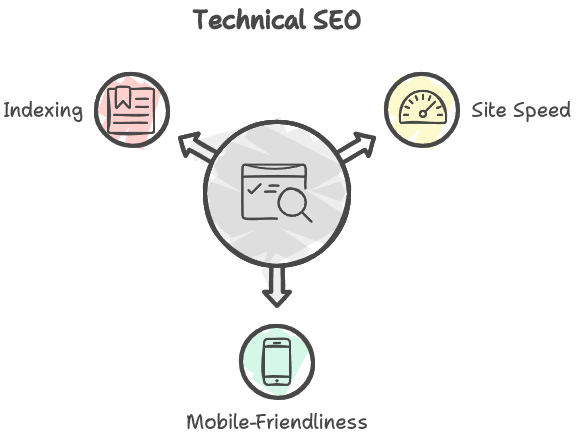
Conducting a thorough technical SEO analysis is essential for optimizing your website. This segment of the SEO audit focuses on critical components that influence your site’s visibility and user experience. Here, we will break down three important areas: site indexing and crawlability, mobile-friendliness assessment, and core web vitals check.
Site Indexing and Crawlability
Ensuring that your website is indexed correctly is fundamental for search engines to understand its content. You should verify that Google is indexing only one version of your site to avoid issues with crawling, indexing, and ranking. Multiple versions of your website can dilute PageRank and adversely affect your SEO rankings.
| Issue | Description | Solution |
|---|---|---|
| Incorrect URL Structure | Can lead to indexing issues | Implement a clean, logical URL structure |
| Duplicate Content | Confuses search engines and may result in penalties | Use canonical tags to specify the preferred version |
| Sitemap Optimization | Improves crawling efficiency | Submit an updated sitemap to Google Search Console |
Check your site index status using tools like Google Search Console. If you observe a sudden drop in organic traffic, this may indicate potential problems with your visibility, such as the need for site optimization (Sagapixel).
Mobile-Friendliness Assessment
Mobile-friendliness is vital for your SEO strategy as it impacts your rankings significantly. Google has prioritized mobile users for years, and more searches are now conducted on mobile devices than desktops (Ahrefs SEO Audit).
To assess your website’s mobile-friendliness, consider the following aspects:
| Criteria | Description | Tool |
|---|---|---|
| Responsive Design | Ensures content displays well on all device sizes | Google Mobile-Friendly Test |
| Page Load Speed | Important for user experience; mobile users generally require faster loading times | PageSpeed Insights |
| Readability | Text must be easily readable without zooming | Check font sizes and layout on mobile devices |
Address any identified issues to enhance user experience and improve your site’s SEO success (Semrush).
Core Web Vitals Check
The Core Web Vitals are a set of metrics introduced by Google that evaluate the user experience on your website. These include:
- Largest Contentful Paint (LCP): Measures loading performance.
- First Input Delay (FID): Assesses interactivity.
- Cumulative Layout Shift (CLS): Evaluates visual stability.
Monitoring these metrics should be part of your SEO site audit to improve site performance (Semrush).
| Metric | Ideal Value | Tool |
|---|---|---|
| LCP | ≤ 2.5 seconds | Google PageSpeed Insights |
| FID | ≤ 100 milliseconds | Google PageSpeed Insights |
| CLS | ≤ 0.1 | Google PageSpeed Insights |
Strong Core Web Vitals are essential as they are confirmed Google ranking factors; regular benchmarking will help you identify issues and enhance the overall user experience (Ahrefs SEO Audit). By addressing these technical areas, you can significantly improve your site’s visibility and performance. For more details on optimizing your site, check out our resources on SEO optimization services and SEO optimization best practices.
On-Page SEO Evaluation
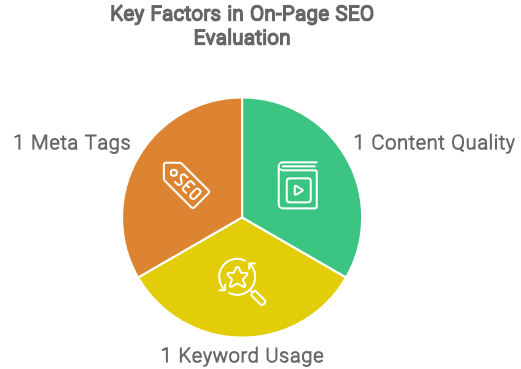
An effective on-page SEO evaluation is essential for maximizing your website’s visibility and attracting the right audience. This section will guide you through key components of your on-page optimization – content optimization, duplicate content identification, and meta data examination.
Content Optimization Review
Content optimization is crucial for enhancing your website’s traffic and improving organic search results. Poorly optimized content can hinder search engines from crawling your site effectively, which in turn affects your visibility (Sagapixel). Focus on the following elements to optimize your content:
| Optimization Element | Considerations |
|---|---|
| Keyword Usage | Ensure that target keywords are used naturally within the text. |
| Readability | Use tools like Hemingway to assess readability and enhance clarity. |
| Internal Linking | Link to relevant pages on your site to improve navigation. |
| Call-to-Action (CTA) | Include clear CTAs that guide users towards desired actions. |
Prioritizing high-quality content will not only improve your SEO but also enhance customer experiences, encouraging repeat visits (Attrock).
Duplicate Content Identification
Duplicate content can significantly impact your website’s performance by confusing search engines about which page to rank for a specific query. This confusion can lead to a substantial drop in traffic (Sagapixel). To identify and resolve duplicate content issues, consider the following:
| Duplicate Content Type | Impact |
|---|---|
| Duplicate Pages | Challenges search engines in ranking the most relevant page. |
| Duplicate Meta Descriptions | Reduces keyword relevance and confuses search engines and users. |
Using an SEO auditing tool can help flag duplicate content issues, ensuring that your website maintains clarity and relevance in search engines.
Meta Data Examination
Meta data plays a crucial role in how search engines and users interact with your website. In an SEO site audit, you should carefully examine elements such as title tags, meta descriptions, and header tags. Pay attention to the following aspects:
| Meta Element | Best Practices |
|---|---|
| Title Tags | Ensure each page has a unique and relevant title that includes target keywords. |
| Meta Descriptions | Create compelling descriptions that summarize page content and include keywords. |
| Header Tags | Organize content logically using H1, H2, and H3 tags for better readability. |
Pages with duplicate meta descriptions not only miss out on keyword opportunities but also risk confusing both search engines and users about content specifics (Semrush). Regular examination of these elements will help you maintain strong SEO performance.
To enhance your overall SEO strategy, consider exploring on-page SEO optimization techniques and investing in SEO optimization services tailored to your specific business needs.
Backlink Profile and Competitor Analysis
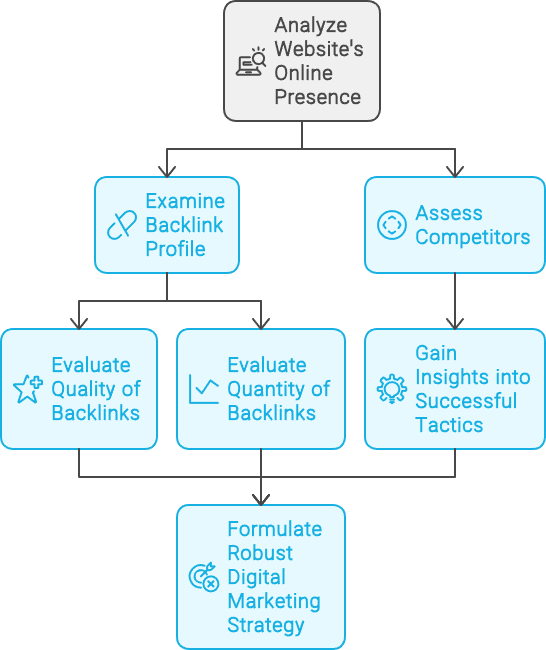
Analyzing your backlink profile and conducting a competitor analysis are critical components in your SEO site audit checklist. These steps help you understand where your website stands in comparison to others and identify opportunities for improvement.
Backlink Quality Assessment
A thorough backlink quality assessment evaluates the links pointing to your website, focusing on their relevance, authority, and trustworthiness. This audit aims to uncover opportunities for optimizing your site to rank better for target keywords. Consider the following metrics in your backlink analysis:
| Metric | Importance |
|---|---|
| Domain Authority (DA) | Measures the overall authority of the linking website. Higher DA means more influence. |
| Spam Score | Indicates the likelihood of a domain being penalized by search engines. Lower scores are preferable. |
| Anchor Text Relevance | The keywords used in the link text. Relevant anchor text improves SEO. |
| Link Equity | Refers to the value passed from one site to another through links. High-quality backlinks pass more link equity to your site. |
Utilizing tools like Moz or Ahrefs can assist you in gathering this data efficiently. For more information about enhancing your website’s structure, explore SEO optimization services.
Competitor SWOT Analysis
Conducting a SWOT analysis (Strengths, Weaknesses, Opportunities, Threats) can provide valuable insights into your competitors’ strategies and identify areas where you can outperform them. Here’s a general outline of how you might structure your analysis:
| Aspect | Description |
|---|---|
| Strengths | What does your competitor do well? Consider aspects like brand reputation, social media presence, or customer loyalty. |
| Weaknesses | Where are they lacking? Look for gaps in their content, low engagement on social media, or poor customer service. |
| Opportunities | Identify areas where they are underperforming. This could include targeting underserved keywords or regions. |
| Threats | Recognize external challenges. High competition in your niche or changes in consumer behavior can impact your SEO strategy. |
This analysis can guide you in creating more impactful content and improving your online visibility. For effective strategies, visit SEO optimization best practices.
Content Gap Identification
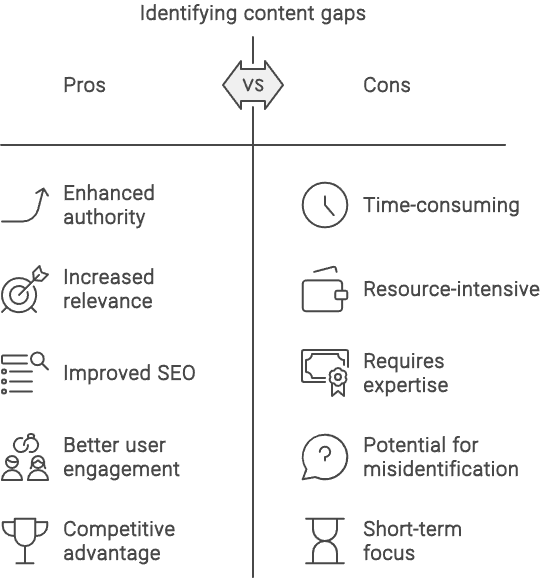
Identifying content gaps is essential for enhancing your website’s authority and relevance within your niche. A content gap analysis helps you find keywords and topics that your competitors are ranking for but you are not. This can lead to the development of valuable new content that attracts traffic.
- Keyword Research: Utilize tools like Google Keyword Planner or SEMrush to uncover keywords your competitors are targeting effectively.
- Competitor Content Review: Analyze your competitors’ blogs and articles to identify missing topics in your own content.
- User Intent Evaluation: Understand searcher intent behind keywords. Ensure that your content addresses users’ needs better than your competitors.
By integrating these strategies, you can enhance your site’s content and better position yourself within your market. For tips on optimizing your on-page content, check out on-page SEO optimization techniques.

